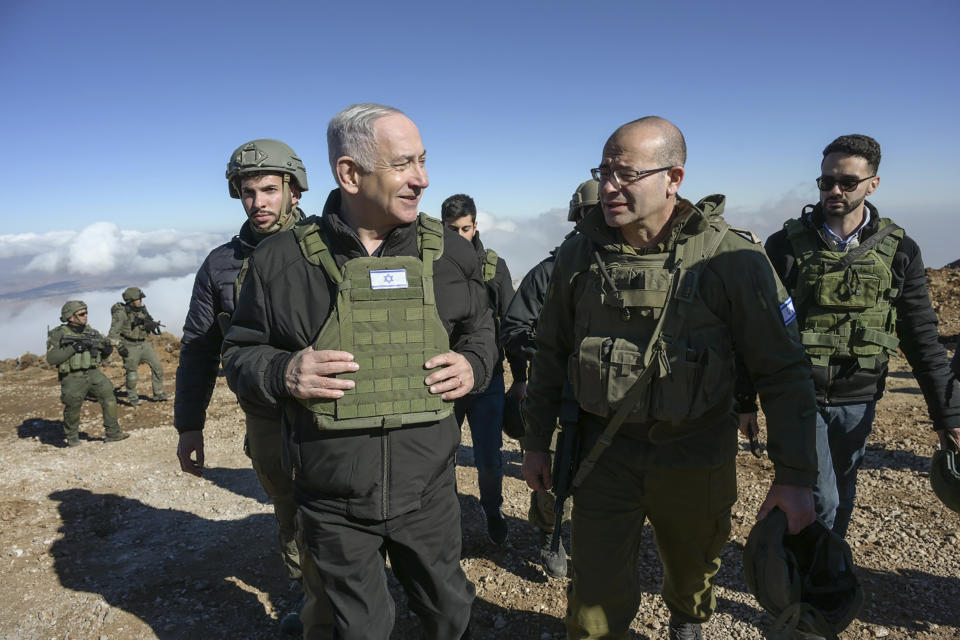
Prime Minister Benjamin Netanyahu said on Tuesday that Israeli forces will stay in a buffer zone on the Syrian border, and specifically on the summit of Mount Hermon, “until another arrangement is found that will ensure Israel’s security.”
Netanyahu made the comments from the mountain’s summit — the highest peak in the area — which is inside Syria, about 10 kilometers (6 miles) from the border with the Israel-held Golan Heights.
This was apparently the first time a sitting Israeli leader had set foot this far into Syria. Netanyahu said he had been on the summit of Mount Hermon 53 years ago as a soldier, but the summit’s importance to Israel’s security has only increased given recent events.
Israel seized a swath of southern Syria along the border with the Israeli-annexed Golan Heights in the days after Syrian President Bashar Assad was ousted by rebels.
Israel’s capture of the buffer zone, a roughly 400-square-kilometer (155-square-mile) demilitarized area in Syrian territory, has sparked condemnation, with critics accusing Israel of violating a 1974 ceasefire and possibly exploiting the chaos in Syria in the wake of Assad’s ouster to make a land grab.
Netanyahu traveled to the buffer zone with Defense Minister Israel Katz, who said he instructed the Israeli military to quickly establish a presence including fortifications, in anticipation of what could be an extended stay in the area.
“The summit of the Hermon is the eyes of the state of Israel to identify our enemies who are nearby and far away,” Katz said.
An Israeli military official, who spoke on condition of anonymity in line with military regulations, said there is no plan to evacuate the Syrians living in villages within the buffer zone.
The buffer zone between Syria and the Israeli-controlled Golan Heights was created by the U.N. after the 1973 Mideast war. A U.N. force of about 1,100 troops had patrolled the area since then.
A U.N. spokesman said Tuesday that the advance of Israeli troops, however long it lasts, violates the 1974 deal that set up the buffer zone.
That agreement “needs to be respected, and occupation is occupation, whether it lasts a week, a month or a year, it remains occupation,” spokesman Stephane Dujarric said.
There was no immediate comment from Hayat Tahrir al-Sham, the insurgent group that led the ouster of Assad, or from Arab states.
Israel still controls the Golan Heights, which it captured from Syria during the 1967 Mideast war and later annexed — a move not recognized by most of the international community. Mount Hermon’s summit is divided between the Israeli-annexed Golan Heights, Lebanon, and Syria. Only the United States recognizes Israel’s control of the Golan Heights.
With Assad now banished, bodies of more than 30 Syrians who vanished under his rule were uncovered in a mass grave on Monday. Forensic teams and rebels worked together to unearth the remains in the village of Izraa, north of the city of Daraa, as families of the missing stood by.
The relatives said they had initially hoped to find their loved ones in prison.
“But we didn’t find anyone and it broke our hearts. They were burned alive here after being doused in fuel,” said Mohammad Ghazaleh, who was waiting at the mass grave site.
Some of the bodies recovered showed evidence that they had been shot in the head or burned, said Moussa Al-Zouebi, head of Izraa’s health directorate.
Syria’s new authorities have set up a hotline for reporting missing persons and secret detention sites.
In the Syrian capital of Damascus, Qatar officially reopened its embassy on Tuesday — nearly 13 years after it severed diplomatic relations with Assad’s government.
Qatar had reaffirmed its “categorical rejection of the regime’s repressive policies against the Syrian people” in a statement earlier. Most foreign embassies in Syria have been shut down since after the country’s civil war erupted in 2011.
The French Embassy in Damascus raised its flag Tuesday in a “symbolic gesture” to show support for the Syrian people during the transition. It’s reopening is pending ongoing evaluation of political and security conditions, French Foreign Minister French Foreign Minister Jean-Noël Barrot said.
The Turkish Embassy in Damascus also recently reopened.
(AP)
Follow the KOIKIMEDIA NEWS 🗞️ CHANNEL on WhatsApp: https://whatsapp.com/channel/0029VatGuwaGufJ1s73IEk0N
